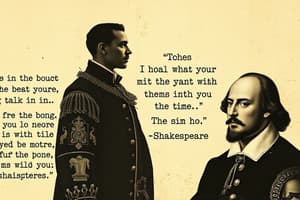Podcast
Questions and Answers
What does Iago mean when he says, 'I lack iniquity / Sometimes to do me service'?
What does Iago mean when he says, 'I lack iniquity / Sometimes to do me service'?
- He is expressing his loyalty.
- He believes he is not evil. (correct)
- He acknowledges his wrongdoing.
- He is justifying his actions. (correct)
What does Iago's statement about having thought to 'yerked him here, under the ribs' parallel?
What does Iago's statement about having thought to 'yerked him here, under the ribs' parallel?
Manipulating Roderigo in Scene 1
What does Iago imply with 'with the little godliness I have'?
What does Iago imply with 'with the little godliness I have'?
He acknowledges his limited virtue.
What does Othello mean by, 'My services, which I have done the signiory, Shall out-tongue his complaints'?
What does Othello mean by, 'My services, which I have done the signiory, Shall out-tongue his complaints'?
What does Othello express in 'For know, Iago, / But that I love the gentle Desdemona'?
What does Othello express in 'For know, Iago, / But that I love the gentle Desdemona'?
What do Othello's words, 'Not I: I must be found. My parts, my title and my perfect soul / Shall manifest me rightly', suggest?
What do Othello's words, 'Not I: I must be found. My parts, my title and my perfect soul / Shall manifest me rightly', suggest?
What is the implication of Cassio saying, 'You have been hotly called for'?
What is the implication of Cassio saying, 'You have been hotly called for'?
What does Iago's statement about Othello boarding a 'land carack' refer to?
What does Iago's statement about Othello boarding a 'land carack' refer to?
What literary device is used when Iago and Cassio exchange lines about Othello's marital status?
What literary device is used when Iago and Cassio exchange lines about Othello's marital status?
What does Othello mean when he says, 'keep up your bright swords, for the dew will rust them'?
What does Othello mean when he says, 'keep up your bright swords, for the dew will rust them'?
What rhetorical device does Brabantio use when he calls Othello a 'thief'?
What rhetorical device does Brabantio use when he calls Othello a 'thief'?
What does Brabantio express when he accuses Othello of enchanting Desdemona?
What does Brabantio express when he accuses Othello of enchanting Desdemona?
What literary device is demonstrated in Brabantio's line about Desdemona shunning 'the wealthy curled darlings of our nation'?
What literary device is demonstrated in Brabantio's line about Desdemona shunning 'the wealthy curled darlings of our nation'?
What does Brabantio imply with, 'Would ever have (t'incur a general mock)'?
What does Brabantio imply with, 'Would ever have (t'incur a general mock)'?
What is Brabantio's accusation towards Othello regarding Desdemona?
What is Brabantio's accusation towards Othello regarding Desdemona?
What does Brabantio mean when he says, 'For if such actions may have passage free'?
What does Brabantio mean when he says, 'For if such actions may have passage free'?
Flashcards are hidden until you start studying
Study Notes
Iago's Characterization
- Iago expresses a sense of lacking evil, creating dramatic irony through his manipulation.
- Suggests Marxist themes of false consciousness in his deception of others.
- Describes intent to harm another person, paralleling manipulation of Roderigo from Scene 1.
Othello's Reputation
- Othello asserts his military service and accomplishments will outweigh any grievances against him, emphasizing reputation over social status.
- Describes his affection for Desdemona, highlighting her gentleness and passivity.
Themes of Trust and Integrity
- Othello states the importance of being found worthy, asserting his character and title will reflect his integrity.
- Iago conveys eagerness for Othello's arrival, with “hotly” suggesting both enthusiasm and a reference to hellish overtones.
Symbolism and Euphemisms
- Iago uses euphemisms and innuendo, suggesting women, like possessions, can be prizes.
- His teases regarding marriage to Desdemona initiates tension through stichomythia, demonstrating duplicity.
Imagery and Religious Connotations
- Othello advises his soldiers to lower their swords, exhibiting a Christ-like demeanor of peace.
- Brabantio refers to Othello as a thief and condemns him, employing the rhetorical device of conduplicatio to express horror.
Racism and Fears of the 'Other'
- Brabantio projects fear of Othello’s marriage to Desdemona, indicating societal fears of miscegenation and the ‘other’.
- He describes Desdemona's innocence and marriage rejection, showcasing his disbelief at her choices.
Critique of Patriarchy
- Othello's elopement with Desdemona is seen as a defiance against patriarchal control, with Brabantio expressing his fears about losing reputation and societal status.
- Brabantio’s accusations of enchantment reflect modern criticism regarding racial and feminist themes, suggesting manipulation over vulnerable youth.
Societal Reactions and Universal Themes
- Brabantio anticipates support from the Duke and others, indicating that his fear of miscegenation resonates beyond personal concerns to broader societal implications.
- His concluding remarks about bond-slaves and pagans raise alarms about the societal implications of interracial marriage, underscoring hostility present in Early Modern England.
Cultural Conflict
- Brabantio's portrayal of Othello as an "abuser of the world" encapsulates societal prejudices and the larger themes of cultural conflict that will reoccur throughout the play.
- The final couplet of Brabantio's speech serves to position the atmosphere of cultural tension that sets the stage for subsequent scenes.
Studying That Suits You
Use AI to generate personalized quizzes and flashcards to suit your learning preferences.




